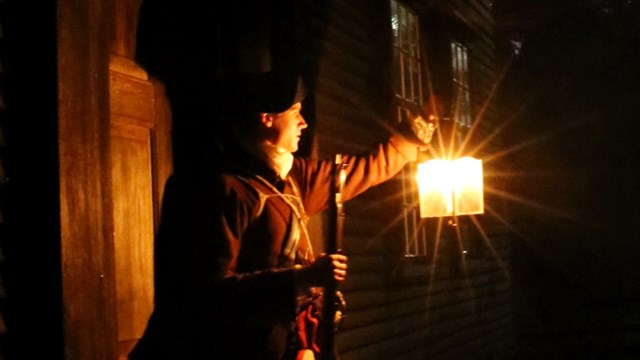Ambush At The Crossroads:
Around noon on April 19, 1775, the column of approximately 700 British regular soldiers began the return march from Concord to Boston. The soldiers intended to seize and destroy colonial stockpiles of arms and military supplies in Concord. The day had so far been a disappointment. In the hours before the Regular's march, Colonial militia removed many of the stockpiles from Concord and ferried them away to safer locations. Worse, there had been fighting in Lexington and later that morning in Concord. The alarm was raised throughout the countryside and minute man and militia companies were mobilizing and marching toward the area in great numbers.
When the column of regulars reached Meriam's Corner, about a mile east of Concord's center, newly arrived companies of militia from Reading, Chelmsford and Billerica arrived and took cover behind the Meriam houses and barns. First to arrive was a company of Reading minute men under the command of Captain Brooks. They had separated from their regiment a few miles up the Bedford Road and pushed ahead towards Concord. When they arrived they saw the British light infantry descending Meriam Hill and pulling back towards the road to cross a small bridge over Elm Brook. Thus temporarily without the protection of its flank guard, the British column was vulnerable to attack. Captain Brooks ordered his men to open fire.
Ensign Jeremy Lister, Light Infantry Company, His Majesty's 10th Regiment of Foot later wrote in his diary:
"On Capt. Parsons joining us [we] begun our march toward Boston again from Concord. The Light Infantry marched over a hill above the town, the Grenadiers through the town, immediately as we descended the hill into the Road the Rebels begun a brisk for but at so great a distance it was without effect, but as they kept marching nearer when the Grenadiers found them within shot they returned their fire. Just about that time I received a shot through my right elbow joint which effectually disabled that arm. It then became a general firing upon us from all quarters, from behind hedges and walls…”
As more militia poured into the crossroads the fighting intensified. Reverend Edmund Foster of the Reading company recalled,
"We rendezvoused near the middle of the town of Bedford, left horses, and marched forward in pursuit of the enemy. A little before we came to Merriam's hill, we discovered the enemy's flank guard, of about 80 or 100 men, who, on their retreat from Concord, kept that height of land, the main body in the road. The British troops and the Americans, at that time, were equally distant from Merriam's corner. About twenty rods short of that place, the Americans made a halt. The British marched down the hill with very slow, but steady step, without music, or a word being spoken that could be heard. Silence reigned on both sides. As soon as the British had gained the main road, and passed a small bridge near that corner, they faced about suddenly, and fired a volley of musketry upon us. They overshot ; and no one, to my knowledge, was injured by the fire. The fire was immediately returned by the Americans, and two British soldiers fell dead at a little distance from each other, in the road near the brook."
At Meriam's Corner, key elements combined to make the militia attack possible. First of all, Captain Brooks' company from Reading, pressing ahead of their regiment, arrived in time to engage the rear of the British column. Second, the column had to pull in their flank guards to cross a bridge over Elm Brook. This slowed their progress and allowed the militiamen to take up positions behind the Meriam houses and outbuildings within range of the bridge and the road.
It's also interesting that Captain Brooks did not wait to see who was going to fire first. According to his account once they realized the red-coated soldiers descending Meriam hill were British regulars, they opened fire. This would make the fight at Meriam's Corner the first offensive action taken by the colonists in the war.





